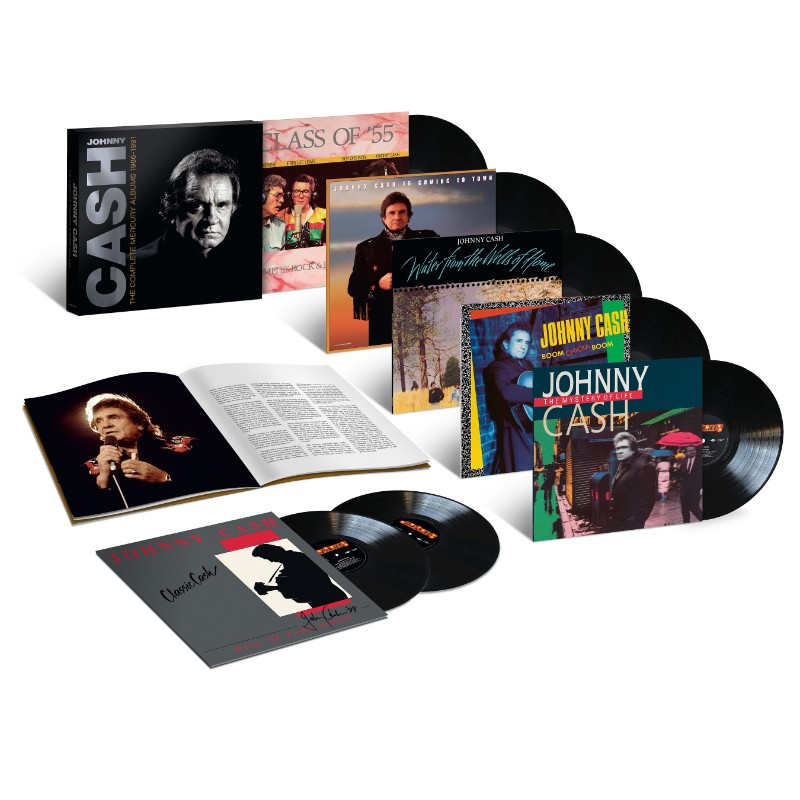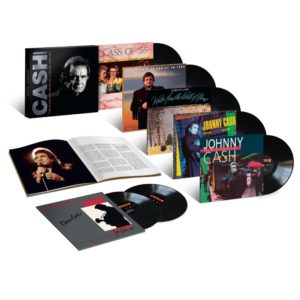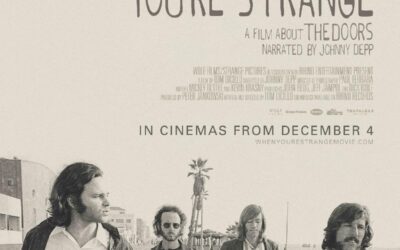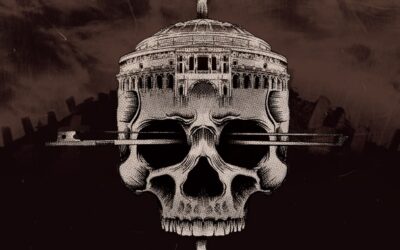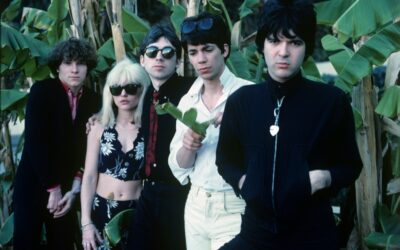By Harvey Kubernik © 2020
Johnny Cash in the mid-1980s found himself between record labels.
Mercury Records in Nashville snatched up the country legend after his 30 year run with the Columbia Records label. Cash subsequently released a string of six albums on Mercury in five years.
While the mid ‘80s to early ‘90s saw Cash, who was still touring heavily, a bit creatively adrift, but he never stopped making music and going into the studio. He signed a deal with Mercury Records at the urging of music business executive, Steve Popovich, after Columbia Records dropped him from the label.
Cash’s work issued from 1986 to 1991, were a diverse collection that included a notable reunion with fellow Sun Records alumni Roy Orbison, Jerry Lee Lewis and Carl Perkins, star-studded collaborations with Paul McCartney and Linda McCartney, Glen Campbell, Waylon Jennings, Emmylou Harris, Hank Williams Jr. and others, inspired takes on songs from Elvis Costello, Guy Clark and Harry Chapin, the Man in Black revisiting his classic hits, and some tunes written by Cash. Cash’s stint with Mercury has never been revisited—until now.
The albums have been remastered from the original Mercury master tapes by noted engineer Kevin Reeves at UMG Studios Nashville. The set was assembled by Grammy Award-winning producer Bill Levenson and features extensive new liner notes by veteran music journalist Scott Schinder.
On April 24, Cash’s overlooked and underappreciated chapter of his catalog will be showcased with a suite of releases via Mercury/Universal Music Enterprises including a comprehensive new box set, The Complete Mercury Recordings 1986-1991, and a new greatest hits album, Easy Rider: The Best Of The Mercury Recordings, a newly assembled collection that compiles 24 highlights selected from Cash’s Mercury catalog. Easy Rider will be released as a single CD, double LP and digital download.
The Mercury/UMe 2020 media announcement described the products.
“The Complete Mercury Recordings 1986-1991, available on 7CD or 7LP on 180-gram vinyl, collects all six albums – Class of ’55: Memphis Rock & Roll Homecoming (1986), Johnny Cash Is Coming to Town (1987), Water from the Wells of Home (1988), Classic Cash: Hall of Fame Series (1988), Boom Chicka Boom (1990) and The Mystery of Life (1991), and – that Cash recorded during his Mercury tenure and presents them together for the first time in a handsome slipcase emblazoned with the distinctive bold Cash logo.”
The CD version of The Complete Mercury Recordings 1986-1991 is augmented with several rare or previously unreleased tracks and an additional 20-track disc of spare early mixes aptly titled Classic Cash: Hall Of Fame Series (Early Mixes), mastered from tapes newly discovered in the Mercury vaults.
Although these never-before-heard versions are not included in the vinyl box, they’re going to be available on April 18 as a Record Store Day exclusive, as a stand-alone limited edition double LP.”
Also due on April 24, all of the albums will be released individually on 180-gram black vinyl, with Classic Cash: Hall Of Fame Series as a two-LP set. Cash revisits vintage classics as “I Walk the Line,” “Ring of Fire,” “Folsom Prison Blues,” “Get Rhythm,” “I Still Miss Someone” and “Sunday Morning Coming Down.”
This marks the first time that Cash’s Mercury era albums have been reissued.
“Cash’s debut album for Mercury, the all-star session, Class of ’55: Memphis Rock & Roll Homecoming, reunited him with fellow Sun Records alumni Jerry Lee Lewis, Roy Orbison and Carl Perkins,” explained the Mercury/Ume statement. With acclaimed Memphis producer Chips Moman behind the board, the four singers tackle a mix of old and new material, including the Cash-led “I Will Rock and Roll with You” and the Presley tribute, “We Remember the King.” Another Elvis ode, John Fogerty’s “Big Train from Memphis,” features a vocal chorus that includes Fogerty, June Carter Cash, Rick Nelson, Dave Edmunds, Dan Penn and the Judds.
“Johnny Cash Is Coming to Town reteamed Cash with the legendary producer “Cowboy” Jack Clement, who as Sun Records’ house engineer had overseen many of Cash’s ’50s sessions and written some of his early hits. The album’s studio team includes wife June Carter Cash and her singing siblings Anita and Helen and daughter Carlene Carter, Cash’s then son-in-law Marty Stuart, and Waylon Jennings, who lends his voice to the warmly nostalgic “The Night Hank Williams Came to Town.” Other highlights include rousing readings of Elvis Costello’s “The Big Light.”
“With Clement producing again, the star-studded Water from the Wells of Home features guest appearances by Cash’s wife June Carter Cash and daughter Rosanne Cash, along with Glen Campbell, Jessi Colter, the Everly Brothers, Tom T. Hall, Emmylou Harris, Waylon Jennings, Paul McCartney and Linda McCartney and Hank Williams Jr. on an eclectic set of material including “That Old Wheel,” a duet with Williams that became Cash’s highest-charting single in over a decade.
“With Nashville musician Bob Moore producing, Boom Chicka Boom —named in honor of the trademark rhythm that Cash pioneered in the ’50s—is a straightforward vehicle for Cash’s talent, vision and humor. Highlights include the surreal Cash composition “A Backstage Pass,” a remake of Harry Chapin’s “Cat’s in the Cradle” and the poignant “Hidden Shame,” which Elvis Costello wrote for Cash. The CD of Boom Chicka Boom includes seven bonus tracks not on the original album, including several B-sides and early versions and the unreleased gem “I Draw The Line.”
The Mystery of Life, again produced by Clement, emphasized Cash’s own songwriting, e.g. “The Greatest Cowboy of Them All” and “I’m An Easy Rider,” while also dipping into the songbooks of Tom T. Hall and John Prine. The CD version of The Mystery of Life also includes Cash’s historic collaboration with U2, “The Wanderer,” that appears as an extended version previously released only on the soundtrack album of director Wim Wenders’ film Faraway, So Close.”
The Complete Mercury Recordings 1986-1991 and Easy Rider: The Best Of The Mercury Recording represent an overdue deep dive into Johnny Cash’s Mercury catalog, revealing its importance as the bridge between his better-known work for other labels.
Scott Schinder in his box set liner notes touted these recordings which “stand as a notable transitional body of work, and an illuminating prelude to the full-blown creative resurgence that Cash would experience in the 1990s.”
Cash’s output for Mercury contained some nice musical undertakings around weak choices of material and the uneven album productions before his artistic renaissance and retail renewal began with producer Rick Rubin at American Recordings.
“One song Johnny recorded during his brief spell on Mercury was ‘The Night Hank Williams Came to Town,’ volunteered Robert Hilburn, author of the definitive biography, Johnny Cash: The Life, in a 2014 interview we conducted. ‘It was co-written by Bobby Braddock, who co-wrote ‘He Stopped Loving Her Today.’
“There were also a couple of great songs John wrote while under contract to Mercury in the late 1980s/early 1990s, but he didn’t want to put them on a Mercury album because he knew they’d get lost.
“Country radio had forgotten about him by then and Mercury wasn’t promoting his albums. But he played them for Rick Rubin and Rick loved them. So, he put them on the American Recordings album: ‘Like a Soldier,’ a wonderful summation of his life and regrets,” and ‘Before My Time,’ a sweet, tender love song.
“Also, there’s a magnificent recording that many Cash fans may not know: ‘The Wanderer,’ a modern gospel tale that he recorded in Dublin with U2. It was on the Zooropa album.”
In Johnny Cash news, scheduled for 2020 is a Cash-themed documentary, My Darling Vivian, from director Matt Riddlehoover, which traces the romantic and wrenching relationship and journey of Vivian Liberto, Cash’s first wife, and mother of his four daughters. It’s produced by Dustin Tittle, the grandson of Vivian Liberto and Johnny Cash.
The film has exclusive, unprecedented access to never-before-seen footage, archives and photographs, as well as to Vivian and Johnny’s daughters themselves. Roseanne Cash, Kathy Cash, Cindy Cash, and Tara Cash Schwoebel.
In 2008, Vivian Liberto Cash wrote I Walked the Line: My Life with Johnny Cash, following the 2005 Johnny Cash’s biopic Walk The Line, an Oscar-winning box office success.
Highly recommended is the 2008 Morgan Neville and Robert Gordon-directed full-length documentary Johnny Cash’s America. It’s a comprehensive and engaging talking head film and accompanying 2-CD soundtrack set that spans Cash’s life.
Another well-received documentary 2029 documentary on Cash, directed by Thom Zimny, The Gift: The Journey of Johnny Cash premiered at SXSW in Austin, Texas. The film examined the live recording Cash and his band did in 1968 at Folsom Prison in California. That event serves as a central motif of the movie and features interviews with family and celebrated collaborators.
Johnny Cash spent large portions of a decade of his life, 1958-1966, in Southern California after leaving Sun Records, doing his first gospel LP when signed to Columbia Records, after relocating from Memphis Tennessee to Ventura County.
On August 13, 1957 at a party in California Cash first met British-born record producer Don Law after a local television appearance who first suggested to Johnny about joining Columbia Records after Cash’s contract with Sun ended on August 1, 1958.
In August 1958 Cash and clan moved to California and he rented an apartment on Coldwater Canyon Avenue in North Hollywood. Later that year Cash and his family bought a ranch house from comedian/TV host Johnny Carson on Havenhurst Avenue in Encino in the San Fernando Valley.
Johnny Cash Enterprises was once located on Sunset Blvd. at the Crossroads of the World complex in Hollywood. Cash, and his pal, actor, singer and radio host, Johnny Western, along with Pat Shields, a PR guy doing promotions for Liberty Records, also had a company called Great Western Enterprises on Western Avenue in Hollywood.
Country music singer, musician and actress Barbara Mandrell, who hails from Riverside, Ca. has another local link to Cash. I met her at MCA Records in when I was West Coast Director of A&R for the label around the time the company purchased ABC Records in 1979.
I talked to Barbara for 15 minutes one evening about Johnny at a label function in Hollywood on Sunset Blvd. Cash saw her in 1960 when she was age 13 on the local LA television show Town Hall Party, which was filmed in Compton near downtown Los Angeles. Johnny and his manager were so impressed viewing her TV appearance that they arranged her first out-of-state tour on an artist package that included Patsy Cline in 1962. It was Barbara’s first airplane trip where she sat next to Cash on the flight.
When Johnny Cash died in 2003, writer Todd Everett emailed me about a 1963 Ventura College benefit Cash did for the police department, “‘cause Johnny was always getting in trouble in an area between Ventura County and Ojai California, his young girls with his first wife Vivian grew up there. And Cash purchased his father a trailer home. And if that ain’t country you can kiss my ass.”
Guitarist and songwriter Pat Di Puccio aka Pooch of Flipside Magazine fame fondly remembers another Cash-In-California moment. His 1966 anecdote further sheds light on Johnny’s deep bond he forged with his fans.
“It was around ’66, I believe, that my Big Brother of America took me to see Johnny Cash play a show with Tex Ritter at the Ventura Theater. Johnny had informed him on how to put out his solo records, and my Big Brother never failed to support Johnny by buying his records and seeing him perform. After the theater show, Johnny was scheduled to play a set of religious songs at a local church with the Carter Family and the Statler Brothers.
“The trek from Los Angeles to Ventura was quite a long one, so I kept falling asleep during the program. Afterwards, Johnny had asked my Big Brother if he and I would like to go back to his house for doughnuts, a very cool gesture. Unfortunately, my Big Brother had to get me back home, as it was a school night. I always remember that, even when Johnny was a celebrity, he still found time to connect with his fans. Of course, I do wish I’d have been able to take him up on his late night offer,” sighed the musician.
The musical and spiritual connection Johnny Cash had with Hollywood and Los Angeles continued into the nineties and until Cash died on September 12, 2003, at age 71.
Johnny’s management for many decades was based in Southern California and his return to global attention via the chart and video success with “Hurt” occurred locally.
I interviewed Rick Rubin in 2008 for my book Canyon of Dreams The Magic and the Music of Laurel Canyon. Rubin reinforced the influence and impact the region had on Johnny.
“Johnny stayed at my house in the Hollywood Hills. I think he really loved coming to LA. We would go to the Ivy for lunch when he would come to town. We’d always have a good time and June would love shopping in LA. We always had fun when he came to L.A. we looked forward to it. ‘Hurt’ was recorded in the Hollywood Hills.
“As far as the song ‘Hurt,’ I’ve been a fan of Nine Inch Nails forever. ‘Hurt’ was on an existing Nine Inch Nails record. And in looking for songs for Johnny to do it was always about the words. And I would just try and find the words that I could imagine the mythical Man In Black feeling. I heard those words and thought, ‘This would really take on a whole new language with Johnny singing them, only because of lyrical content.’
“Johnny and I would exchange CD’s of ideas of what songs to record. I would send him a CD of 20 songs and he would send me a CD of 20 songs and we’d talk about it after. And sometimes I’d feel stronger about some songs than others but pretty much I thought would be appropriate and he’d say, ‘I think I want to do these three.’ And I can remember when I sent that CD with the Nine Inch Nails song I remember telling him, even before he heard it, ‘I feel this one particular song can really be special and really be different.’ And that was unusual for me because in the process that we do we never talk about specific songs. We never think about singles ever. It’s always a body of work, just a great body of work. But for some reason I had a feeling that this was one that would really be good. Not just that the song would be great for him to sing but by him singing it that would change the way the song was perceived. It made it a new thing. It resonated completely with him singing it.
“He said he loved it and was excited to do it. We did it in LA, not my Laurel Canyon house but my north of Sunset house in the Hollywood Hills. Johnny was there. I think we built the track first. Benmont Tench was playing keyboards, Mike Campbell is playing guitar and I believe Smokey Hormel was playing guitar. We built this track and then Johnny sang it.
“It’s fantastic and the perfect bookend for his career. For me his Sun Records are probably my favorite and for him to start with the Sun Records and with the American Records it just really felt like he came full circle. Even though the records are nothing like each other. It just felt right. He deserved to end as strong as he started.”
On August 16, 1975 forty miles from Los Angeles, California, I interviewed Johnny Cash for the now defunct Melody Maker inside the Royal Inn Hotel in Anaheim.
Johnny Cash was born in Kingsland, Arkansas, on February 26, 1932. We share the same February 26th birthday.
In 1965 I saw a Johnny Cash Shindig! taping on Prospect Ave. in Los Angeles at ABC-TV studios, and in 1968 when he guested on The Summer Smothers Brothers Show at CBS Television City. I later witnessed Johnny and June Cash at The Anaheim Convention Center, The Troubadour and The House of Blues in Hollywood. I must have seen their act over a dozen times in 25 years.
During 1975, Johnny was in Southern California to promote his autobiography, Man In Black, and to perform a special concert for the Christian Booksellers convention.
“It covers the ups and downs of my life and music career and my problem with drugs,” stressed Cash. “The book also contains 20 song lyrics which provide a musical guideline. The lyrics help tell the story. It was time to do the book and set the record straight. About a year ago I was approached by the publisher to write it. I spent nine months writing it and shaping it. I wrote it by hand and worked with an editor.
“It was a whole new project for me. More discipline was involved. It was my main activity for months when I got up in the morning. It was hard lookin’ back through my life and trying to remember conversations and details. Remembering some of the nightmares that I had especially gettin’ off drugs. I went through a total soul-searching experience lookin’ back. I went through all the pain again to a certain degree,” confessed Johnny, whose book eventually sold over a million copies.
“In concert I sing ‘Sunday Morning Coming Down,’ the Kris Kristofferson tune. That’s so much of me that sometimes I feel like I wrote it. There are some songs that I must write for self-expression. If a song comes along I must acknowledge it. I’ve recently recorded a song ‘Strawberry Shortcake.’ It’s about a guy who went into the Plaza hotel in New York and stole a cake. It’s a novelty song. But there are some songs that I had to write like ‘I Walk the Line.’”
(Harvey Kubernik is the author of 16 books. His literary music anthology Inside Cave Hollywood: The Harvey Kubernik Music InnerViews and InterViews Collection Vol. 1, was published in December 2017, by Cave Hollywood. Kubernik’s The Doors Summer’s Gone was published by Otherworld Cottage Industries in February 2018. It was nominated for the 2019 Association for Recorded Sound Collections Awards for Excellence in Historical Recorded Sound Research.
In November 2018, Sterling/Barnes and Noble published Kubernik’s The Story of The Band From Big Pink to the Last Waltz. During 2020 Harvey and Kenneth Kubernik are writing a multiple voice narrative book on Jimi Hendrix for Sterling/Barnes and Noble scheduled for publication September 15, 2020.
In 2020 The National Recording Registry at the Library of Congress in Washington, D.C. are exhibiting a Harvey Kubernik essay on the landmark The Band album, which celebrated a 50th anniversary edition in 2019.
Kubernik’s 1995 interview, Berry Gordy: A Conversation With Mr. Motown appears in The Pop, Rock & Soul Reader edited by David Brackett published in 2019 by Oxford University Press. Brackett is a Professor of Musicology in the Schulich School of Music at McGill University in Canada. Harvey joined a lineup which includes LeRoi Jones, Johnny Otis, Ellen Willis, Nat Hentoff, Jerry Wexler, Jim Delehant, Ralph J. Gleason, Greil Marcus, and Cameron Crowe.
Kubernik’s 1996 interview with poet/author Allen Ginsberg was published in Conversations With Allen Ginsberg, edited by David Stephen Calonne for the University Press of Mississippi in their 2019 Literary Conversations Series.
This century Harvey wrote the liner note booklets to the CD re-releases of Carole King’s Tapestry, Allen Ginsberg’s Kaddish, Elvis Presley The ’68 Comeback Special and The Ramones’ End of the Century.
In 2020 Kubernik served as Consultant on a new 2-part documentary Laurel Canyon: A Place In Time. Alison Ellwood is the director who helmed the History of the Eagles. Premium television network EPIX will broadcast it on Sunday, May 31st at 10 p.m., and conclude the following Sunday, June 7th at 10 p.m.).

